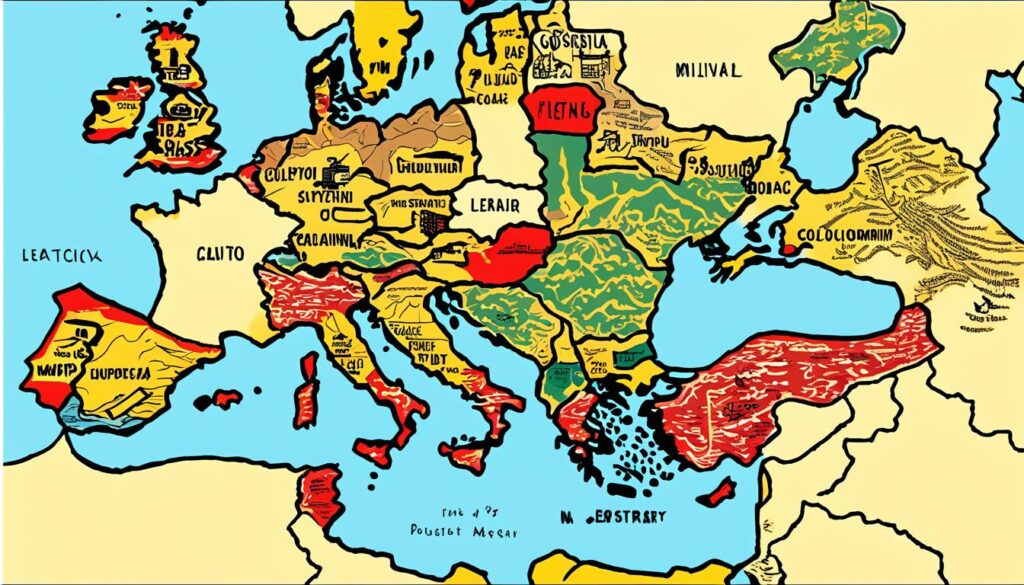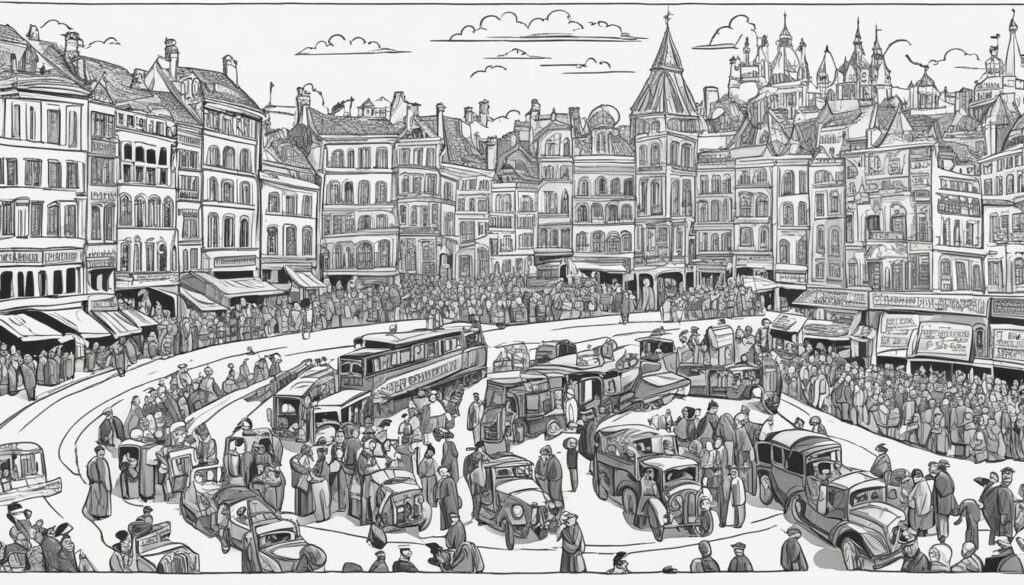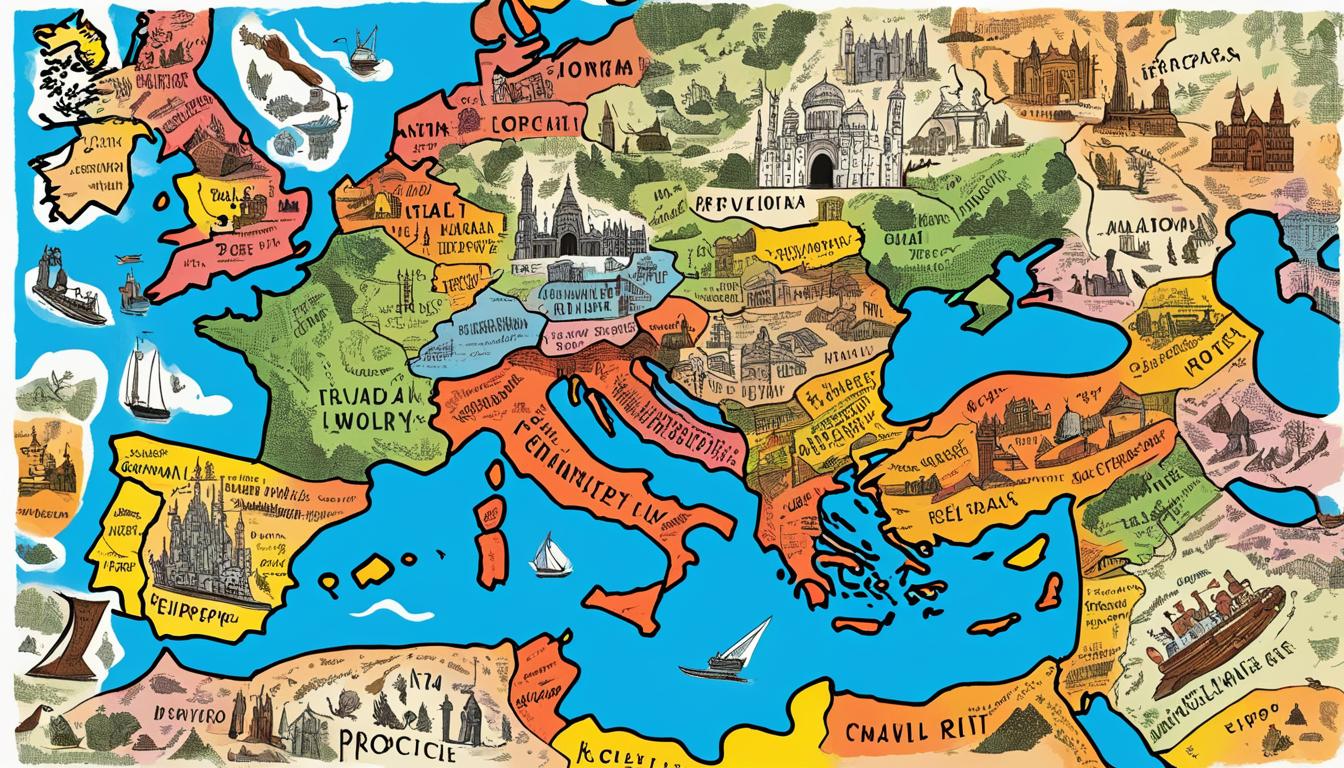In this article, we delve into the book Provincializing Europe by Dipesh Chakrabarty. As a historian and scholar of postcolonial thought, Chakrabarty presents a provocative critique of Eurocentric historical perspectives.
Throughout this article, we explore Chakrabarty’s arguments and main themes, analyzing the need to challenge and reframe traditional historical narratives. We discuss the concept of postcolonial thought and its significance in understanding power dynamics and diverse perspectives. We also critique Eurocentrism and universal narratives, examining their limitations in shaping our understanding of history.
Ultimately, we draw implications for knowledge production and decolonization, exploring alternative frameworks for understanding historical difference. In our analysis, we assess the impact and relevancy of Chakrabarty’s work, considering its significance in shaping broader academic discussions and promoting postcolonial thought.
Join us as we explore the key takeaways from Provincializing Europe and reflect on its legacy as a seminal work of postcolonial scholarship.
Overview of “Provincializing Europe”
In his book “Provincializing Europe,” Dipesh Chakrabarty challenges traditional Eurocentric historical perspectives by reimagining the concept of historical difference. Through an exploration of postcolonial thought and a critique of Eurocentrism, Chakrabarty argues for the need to recognize and incorporate diverse experiences and perspectives into global historical narratives.
The book is divided into three parts. The first part examines the limitations of Eurocentric perspectives and the need to provincialize Europe in historical narratives. The second part explores the concept of postcolonial thought and its relevance in understanding power dynamics and global history. The final part proposes alternative frameworks for understanding historical difference, beyond Eurocentric perspectives.
Chakrabarty’s work has been influential in reshaping historical narratives and promoting postcolonial thought, providing a new lens through which to analyze global power dynamics and cultural hegemony.
Author Background: Dipesh Chakrabarty
Dipesh Chakrabarty is a renowned historian and postcolonial theorist, with a focus on South Asian history and its intersection with global issues. He was born on August 15, 1948, in Kolkata, India, and completed his Bachelor’s and Master’s degrees in history from the University of Calcutta. Afterward, he obtained his Ph.D. from the Australian National University in Canberra, where he specialized in modern Indian history.
Throughout his distinguished academic career, Chakrabarty has held several prestigious positions, including the Lawrence A. Kimpton Distinguished Service Professorship at the University of Chicago and the Mellon Chair in the Humanities at Harvard University. He has authored numerous books and articles, including the highly acclaimed “Provincializing Europe.”
“Provincializing Europe attempts to show how the historical experience and the political lessons of colonized countries have been written out of European history… The book is an intervention in historical and political debates that cannot be ignored by anyone who takes seriously the task of speaking for human emancipation in our times.”
In addition to his academic pursuits, Chakrabarty has also been actively involved in public intellectual life, regularly contributing opinion pieces to newspapers and participating in public lectures and debates on various issues related to global history and politics.
The Need for Provincializing Europe
Dipesh Chakrabarty argues that Eurocentric perspectives have become the dominant narrative in historical discourses, thereby dismissing other important and diverse perspectives. Chakrabarty calls for provincializing Europe in historical narratives, which means that Europe’s impact on global history should be contextualized, emphasizing the importance of local and regional histories in shaping worldviews.
Chakrabarty critiques the limitations of Eurocentric perspectives, highlighting how they perpetuate universal narratives of history. These narratives imply that certain events, such as the Enlightenment, are more important than others, ultimately marginalizing other cultures and societies. Provincializing Europe means to dismantle this Eurocentric perspective and take into account other cultural and historical traditions, emphasizing multiculturalism and emphasizing why a global perspective is necessary for a complete understanding of history.
This approach is critical to decolonizing knowledge production and promoting postcolonial thought. By acknowledging and promoting diverse perspectives, we can better understand power relations, inequalities, and colonialism’s ongoing effects. Provincializing Europe demonstrates how alternative frameworks can create a more truthful and comprehensive history, including diverse experiences and perspectives.
Postcolonial Thought
Postcolonial thought emerged as a critical response to the colonial legacy and its impact on global history and power dynamics. It originated in the 1960s and 1970s with the works of intellectuals from the Global South, such as Frantz Fanon, Edward Said, and Homi Bhabha. Postcolonial theorists challenge Eurocentric historical perspectives and highlight the importance of multiple perspectives, local knowledge and narratives in understanding and interpreting historical events.
Postcolonial thought emphasizes the need to analyze the legacy of colonialism and imperialism in shaping the global socio-economic and political systems, and the persistent influence of such legacies in contemporary times. It also highlights how colonialism negatively impacts the social, cultural, and psychological well-being of colonized communities and contributes to the formulation of an identity that is often hybrid.

The table below showcases some of the major concepts related to postcolonial thought and their definitions.
| Concept | Definition |
|---|---|
| Colonialism | A political-economic system in which a country extends its control over other territories or countries through colonization |
| Nationalism | A political ideology that emphasizes the importance of a nation’s sovereignty and independence from external control |
| Hybridity | The blending of multiple cultural identities, resulting from colonialism and cultural encounters |
| Othering | The process of creating a binary of ‘us’ versus ‘them’ based on race, ethnicity, religion, gender, or other identity markers |
| Subaltern | A term coined by Gramsci to refer to marginalized groups who are denied access to political power and cultural representation |
Through postcolonial thought, we gain a better understanding of the complex interplay between power, history, and identity, and how these factors shape our world.
Critiquing Eurocentrism
Dipesh Chakrabarty challenges the pervasive Eurocentric biases in historical narratives, arguing that they limit a more nuanced understanding of the diverse experiences that contribute to the global historical record. This critique of Eurocentrism stems from the recognition that prevailing historical perspectives focus primarily on the Western world, marginalizing the cultural and political contributions of non-Western societies and diminishing our shared global heritage.
Chakrabarty calls for a new approach to historical scholarship, one that transcends traditional Western interpretations of the past and brings to light the complexities of non-Western cultures. By acknowledging the contributions of non-Western societies to global history, we can begin to reconstruct a more inclusive, comprehensive and equitable shared narrative.
“Eurocentrism was and is a myth. A prevalent myth is nonetheless a myth. It is a story we tell ourselves without necessarily recognizing it as a story, all too often regarding it as if it were ‘the truth’.”
Through his critique of Eurocentrism, Chakrabarty challenges us to rethink our conception of history and how we understand the world around us. By delving deeper into non-Western perspectives, we can enrich our understanding of the past and present and move towards a more equitable future.
Questioning Universal Narratives
Chakrabarty’s work challenges the idea of universal narratives within historical discourses. He argues that Eurocentric perspectives have dominated historical narratives, leading to the erasure of diverse experiences and perspectives from non-Western cultures.
The notion of a universal narrative assumes that there is a single, objective truth that shapes history. However, Chakrabarty asserts that history is subjective and shaped by social, cultural, and political contexts.
By questioning universal narratives, Chakrabarty prompts readers to consider the ways in which histories are constructed and the potential biases and limitations inherent in such constructions.
“To provincialize Europe is to understand that Europe will always be one of the provinces of a larger world, no matter how widespread its pretensions to universality.” – Dipesh Chakrabarty
Chakrabarty’s insights challenge readers to examine the complexities of historical narratives and to consider the diverse perspectives that shape our understanding of the past. By acknowledging multiple viewpoints, we can move beyond the constraints of universal narratives and embrace a more nuanced and inclusive understanding of history.
Reimagining Historical Difference
In “Provincializing Europe,” Dipesh Chakrabarty challenges traditional Eurocentric perspectives on history and proposes a new framework for understanding and interpreting the past. This framework, according to Chakrabarty, involves reimagining historical difference, or thinking beyond the categories and structures imposed by colonialism and Eurocentrism.
Chakrabarty argues that Eurocentric historical narratives tend to impose Western ideas and structures onto non-Western societies, leading to incomplete and distorted accounts of the past. Instead, he suggests that we must recognize the diverse range of historical experiences and perspectives, without privileging any particular group or culture.
This requires a fundamental shift in the way we approach the study of history, moving away from universalizing frameworks and towards more critical and self-reflexive methods. By reimagining historical difference, we can gain a more nuanced and accurate understanding of the complexities of the past, while also challenging dominant power structures and promoting social justice.
“We need to think about the non-European world, not simply as a recipient of European influence, but as an active participant in its own history.”
Decolonizing Knowledge
In “Provincializing Europe,” Dipesh Chakrabarty challenges the Eurocentric structures embedded in knowledge production. Decolonizing knowledge involves dismantling these structures and centering diverse perspectives.
It is crucial to understand how colonialism impacted academia and knowledge production, with many disciplines and theories based on a Western-centric, colonial perspective. Decolonizing knowledge requires acknowledging and addressing this, creating space for marginalized voices and non-Western contributions.
Chakrabarty emphasizes the importance of recognizing the agency and autonomy of non-Western societies and histories, avoiding reducing them to mere objects of study. Decolonizing knowledge production entails promoting an inclusive, equitable approach that values diverse perspectives and challenges hierarchical structures.
As Chakrabarty highlights, the decolonization of knowledge is essential for addressing the ongoing effects of colonialism and promoting social justice. It requires sustained efforts to center marginalized perspectives and challenge dominant narratives, with the ultimate goal of creating a more inclusive and just society.
Global Impact and Relevance
The impact of Dipesh Chakrabarty’s “Provincializing Europe” extends far beyond the academic community, reaching a global audience and influencing broader discussions on decolonization and historical narratives. Chakrabarty’s work has been praised for its insightful critique of Eurocentric perspectives and its emphasis on acknowledging diverse experiences and perspectives.
Since its publication, “Provincializing Europe” has become a seminal text in postcolonial studies, prompting scholars and activists to reexamine established historical narratives and question universal claims to knowledge. Chakrabarty’s proposition of reimagining historical difference and decolonizing knowledge has also inspired a growing movement of scholars and thinkers committed to challenging the legacy of colonialism in knowledge production.
Overall, Chakrabarty’s work highlights the ongoing relevance and urgency of engaging with postcolonial thought and challenging Eurocentric perspectives. As we continue to grapple with global issues that have roots in colonial histories and power dynamics, “Provincializing Europe” offers a timely reminder of the importance of diverse perspectives and decolonizing knowledge to attain a better understanding of the world and its complexities.
Criticisms and Controversies
Despite its widespread acclaim, Provincializing Europe has not been without its fair share of criticisms and controversies.
One of the main criticisms directed at Chakrabarty’s work is his reliance on postcolonial theory, which some argue is overly focused on deconstructing Western-centric perspectives without offering viable alternative frameworks.
Others have challenged Chakrabarty’s proposed solution of provincializing Europe, arguing that it risks neglecting the unique contributions of European history and culture. Some also argue that Chakrabarty’s work oversimplifies the complex and nuanced nature of historical narratives and power dynamics.
Despite these criticisms, Provincializing Europe remains a significant and thought-provoking contribution to postcolonial studies and historical discourse.
Key Takeaways from “Provincializing Europe”
After exploring Dipesh Chakrabarty’s “Provincializing Europe,” several key takeaways emerge:
- Challenging Eurocentrism: Chakrabarty’s central argument is that Eurocentric historical narratives perpetuate limited perspectives that fail to acknowledge diverse experiences and perspectives from around the world.
- The importance of postcolonial thought: Postcolonial thought emerges as a critical tool for understanding global history and power dynamics, challenging dominant narratives and highlighting the need for a broader, more inclusive perspective.
- The need to decolonize knowledge: Chakrabarty emphasizes the importance of dismantling colonial structures within academia and beyond in order to promote a more equitable, just society.
- The relevance of reimagining historical difference: Chakrabarty’s proposition of reimagining historical difference offers an alternative framework for interpreting history beyond Eurocentrism, broadening perspectives and encouraging critical analysis.
Overall, “Provincializing Europe” offers a compelling critique of Eurocentrism and a powerful call to action for decolonizing knowledge and promoting diverse perspectives in historical narratives.
Impact and Legacy
The impact of Dipesh Chakrabarty’s “Provincializing Europe” has been significant in reshaping historical narratives and promoting postcolonial thought. By challenging the Eurocentric lens through which much of history has been written, Chakrabarty has encouraged a more nuanced and diverse understanding of global history, one that recognizes the agency and experiences of non-Western societies and cultures.
His work has not only influenced academic discussions but has also impacted broader social and political discourse, inspiring movements towards decolonization and the recognition of marginalized voices. The legacy of “Provincializing Europe” lies in its enduring relevance and power to provoke critical reflection on the unequal power dynamics that have shaped our world.
“The present isn’t an heirloom but a future perfect that has yet to be delivered.” – Dipesh Chakrabarty, “Provincializing Europe”

“Chakrabarty’s “Provincializing Europe” provides an important framework for understanding the complexities of historical narratives and their impact on our present. His insights into postcolonial thought have inspired a new generation of scholars and activists to challenge the legacies of colonialism and promote a more just and equitable society.”
The Global Reach of Chakrabarty’s Work
The global reach and impact of Chakrabarty’s work are evident in the growing interest in postcolonial studies and the ways in which it has infused interdisciplinary scholarship across the humanities and social sciences. His ideas have crossed geographical and disciplinary boundaries, offering a framework for understanding the complexities of global history and its ongoing legacies.
The Enduring Significance of “Provincializing Europe”
Chakrabarty’s “Provincializing Europe” remains a seminal work in the field of postcolonial thought. Its enduring significance lies in its ability to provoke critical reflection on the ways in which global histories have been shaped by unequal power dynamics. By challenging the Eurocentric lens through which much of history has been written, Chakrabarty offers a powerful framework for understanding the complexities of our world and imagining a more just and equitable future.
Conclusion
In conclusion, “Provincializing Europe” by Dipesh Chakrabarty represents a groundbreaking contribution to postcolonial thought and the decolonization of historical perspectives. Chakrabarty’s call to provincialize Europe challenges the Eurocentric narratives that have dominated historical discourse, emphasizing the importance of acknowledging diverse experiences and perspectives. Through his critique of Eurocentrism and questioning of universal narratives, Chakrabarty offers alternative frameworks for understanding and interpreting history, reimagining historical difference beyond Western-centric perspectives.
Furthermore, Chakrabarty’s proposition of decolonizing knowledge production highlights the need to dismantle colonial structures within academia and beyond, promoting a more inclusive and equitable approach to knowledge creation and dissemination. The impact and relevance of “Provincializing Europe” extends far beyond postcolonial studies, inspiring broader discussions of decolonization and historical difference across various disciplines.
Overall, “Provincializing Europe” offers a compelling and insightful perspective on the limitations of Eurocentric historical perspectives and the need to acknowledge diverse and complex experiences in understanding global history. As such, this book is a must-read for anyone interested in challenging dominant historical narratives and promoting a more inclusive and equitable approach to knowledge production and dissemination.



